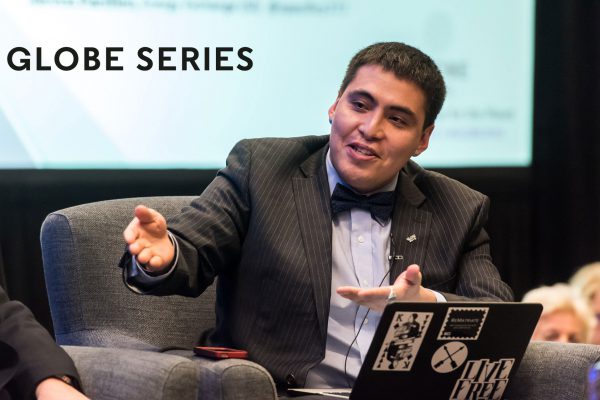GUEST CONTENT
With over 1,300 Shell stations in Canada, filling up under that bright red and yellow sign is a weekly ritual for many Canadians. It’s also one of the activities that generates the most carbon emissions—a quarter of Canada’s carbon footprint is attributed to transportation. Consumers know this and they’re continuing to demand new solutions to reduce their emissions. As GM of Shell’s retail fuels division in Canada, Andrea Brecka leads the company’s efforts to put the customer first. We caught up with her to learn more about how Shell is investing in innovation to transform what it means to “fill ‘er up”.
You have joined the Canadian government, 100 other countries and many of the world’s largest corporations in committing to net-zero emissions by 2050. To achieve this target on a global scale, the latest International Energy Agency report recommends no new oil and gas developments. What does a net-zero future mean for Shell?
Climate change is a very urgent challenge and tackling it requires a fundamental transformation of the global economy, including the energy system. That’s why Shell has stepped forward to set a net-zero-by-2050 target in lockstep with society’s progress and the Paris Agreement.
How will we do that? We’ve identified six levers to help Shell and our customers decarbonize:
- Reducing emissions in our operations.
- Shifting to natural gas.
- Growing a low-carbon power business to provide more renewable electricity and electric vehicle charging points.
- Providing low-carbon fuels, such as biofuels or hydrogen.
- Developing carbon capture and storage, which we’ve already started in Canada.
- Using natural carbon sinks like forests to absorb greenhouse gas emissions.
In terms of the IEA conclusions, they’re based on scenarios and, therefore the demand and supply modeling varies. Shell’s oil production peaked in 2019. Further, we don’t foresee any frontier explorations beyond 2025. All to say, this net-zero commitment is critical for Shell.
I understand Shell Canada has taken steps to reduce Scope 3 emissions. Could you share more about this strategy and why it’s important?
Absolutely. I think it’s fundamentally important that everybody understands what we mean by Scope 1, 2, and 3. We define Scope 1 and 2 as the emissions generated from the extraction and production of the energy products we sell. Scope 3 emissions are generated by the end use of these products. Many people are surprised that more than 90% of Shell’s emissions are Scope 3. The other element that people may not know is that Shell sells many products from other companies, including energy products. In fact, we sell more than three times the energy we produce ourselves. This is why it’s significant that Shell has chosen a commitment to reduce Scope 3 emissions.
I’ll share an example of how we’re helping our customers reduce emissions. Last year, we were the very first fuels retailer in Canada to launch a Drive Carbon Neutral program for our customers to help offset emissions from fuel purchases. Most recently, we’ve announced that carbon-neutral lubricants will be available to customers in key markets, including Canada. This program will offset approximately 700,000 tonnes of CO2 emissions per year.
Tell us more about your new carbon-neutral driving offer.
For a number of years, many customers have been telling us they’re interested in reducing their carbon footprint, but an electric vehicle (EV) is not an option at this time. The Drive Carbon Neutral program helps them have an impact even if they don’t own an EV. It’s very simple to participate: from now until Sept. 7, when customers opt in via the Shell EasyPay app, Shell will offset the emissions from their fuel purchase. It’s a great experience and I highly encourage all our customers to participate.
Alternatively, customers can come inside the store at participating locations and pay 2 cents per litre to offset their emissions. What happens after that? Shell purchases independently verified carbon credits that are generated from either Canadian or international projects designed to protect or restore the natural landscape.
I’m happy to say that, since the launch of this program, we have offset approximately 15 million litres of fuel. The customer feedback is overwhelmingly positive. We’re continuing to evolve the offer and there will be more to come later this year. Stay tuned!
Consumer demand for alternative fuels is growing. How is Shell supporting innovation to meet that demand?
As I referenced earlier, it’s important to be in lockstep with customer demands. In Canada, I’m proud to say that we’ve not only embraced, but I feel like we embody the energy transition. In the last five years, we have transitioned our business from heavy oil to natural gas, we’ve implemented carbon capture and storage here in Alberta, and we continue to do more and more with respect to lower-carbon fuels and renewables. We’re also making a much wider range of lower-carbon products available, such as biofuels and hydrogen, while also increasing the number of charge points for battery electric vehicles.
To give a hydrogen example, Shell has partnered with a hydrogen technology and energy company called HTEC to build two hydrogen refueling stations in the greater Vancouver area. On the biofuels side, there are a couple of innovation examples. We have a 40% interest in the $875 million commercial-scale Varennes carbon recycling plant—the first ever waste-to-low-carbon-fuels plant in Quebec. Secondly, Shell Ventures has made an equity investment in Forge Hydrocarbons Corporation to build a first-of-its-kind $30 million commercial-scale biofuel production plant in Ontario. We’ve also acquired Greenlots, an EV solutions provider, and we will be building EV charging stations across Canada and in the U.S. These are just a few examples of investments Shell has made to advance innovation and accelerate progress.
It’s 2030. I pull into a Shell station. What does it look like?
I think the future retail station will have a mosaic of solutions. Certainly, when you think about the kinds of fueling offers, EV, hydrogen, and biofuels will be standard. We will build future retail stations to be carbon neutral, perhaps taking advantage of solar panels or geothermal power. Lastly, I think about our customers. We have a vision to provide an oasis within the store. In 2030, we’ll have great lounge areas with wifi for people to connect or catch up on some work. In addition to the foods and beverages we have now, we’ll also offer healthier solutions for our customers. We think of our retail stations as not just fueling vehicles, but fueling bodies and minds.
How is Shell addressing calls for a just transition? And as a former president of Shell Canada’s Women’s Network, what role do you see for diversity and inclusion as we transition to a clean economy?
I’m proud to say that when Shell looks at projects like LNG in new areas, we work hard to get to know the communities. That means understanding the community’s wants, meeting its workforce, and addressing local partnerships in a way that’s fair, just, and inclusive.
In my work in the retail business last year, we launched the Fuel Service app. For most of us, fueling your car is a seamless experience, but for some individuals with disabilities, it can be daunting. To address that challenge, we partnered with Fuel Service. Now, individuals have the ability to call ahead and see if a retail station is able to assist them in their fueling.
I’ve worked with Shell for almost three decades. One of the reasons I’ve been here as long as I have is because Shell believes in and takes action on diversity, inclusion, and equity. Even in the last year, Shell is going through a major reorganization and we’ve made a very intentional effort to ensure our leadership team is diverse. This has been wonderful. Everybody wants role models to look up to. Diversity means better quality decisions and better business outcomes.
If you could invite three people, either alive today or no longer with us, to a conversation about the future of energy in Canada, who would they be?
I love this question. I thought long and hard about it. One would be Brian Mulroney. I saw him speak at a Pollution Probe gala last year and in his speech, he said “Successful leaders do not impose unpopular ideas on the public. They make unpopular ideas acceptable to the nation, and that takes courage.” When I think about his legacy of really tackling tough environmental challenges and what he’s been able to accomplish, it’s very inspiring. I would love to ask him how he managed the many challenges and different stakeholders to ultimately make progress.
I also thought about Generation Z and my two young adult daughters. When I think about that generation and what’s important to them, I would love to start a conversation about what they think about companies like Shell. How do they see us playing a role in tackling climate change? I’d love to just listen to their perspectives and have a debate.
Lastly, Elon Musk is a pioneer and a visionary. He’s courageous, bold, and willing to fail fast to make progress. Wow. For a company like Shell that’s undertaking transformational changes, learning from someone who is willing to take a risk to commercialize ideas would be fascinating.




